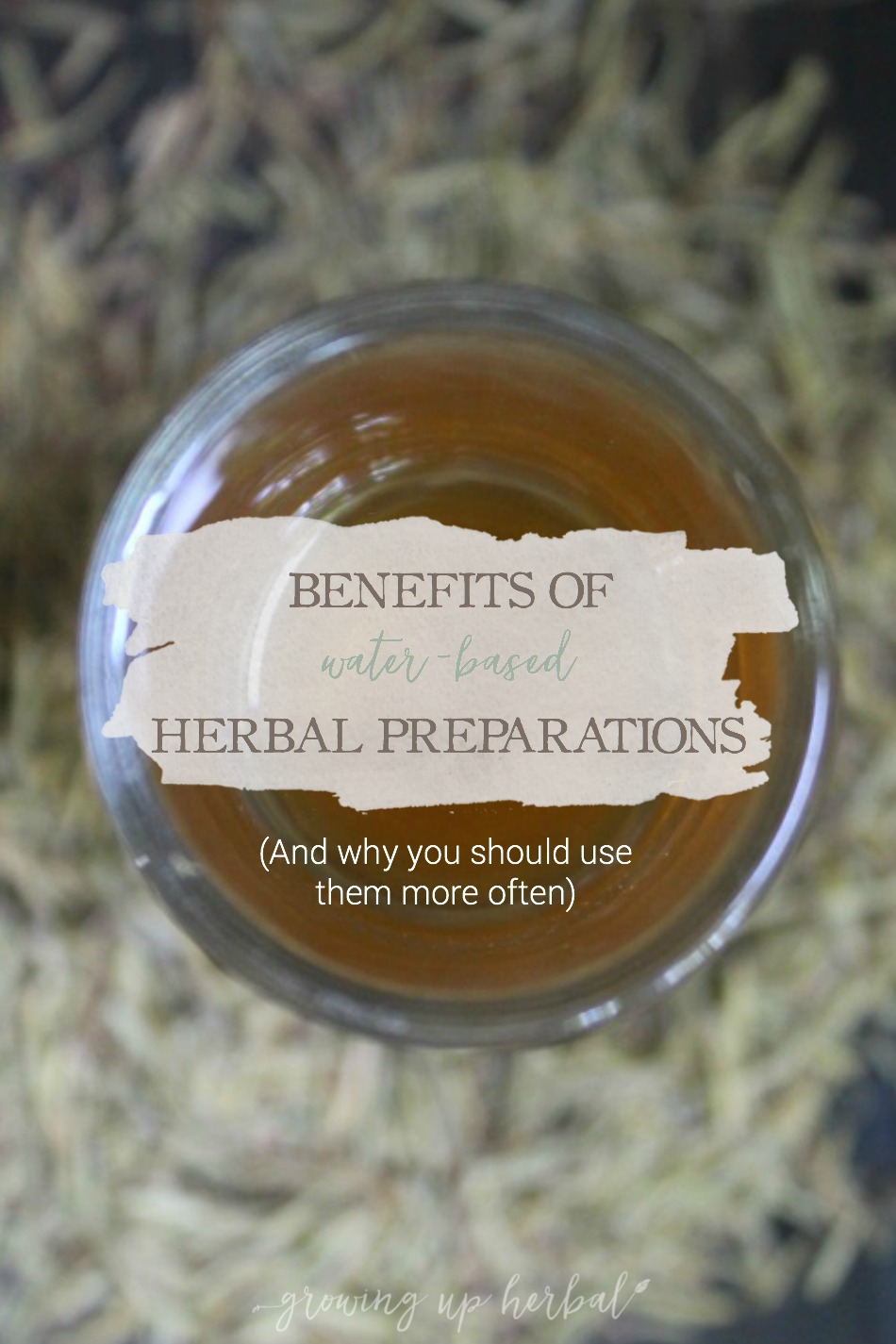Did you know that water-based herbal preparations like teas, infusions, and decoctions are one of the BEST ways to extract the health benefits of herbs?
It’s true. Water is the universal solvent which means that, given enough time, it will break almost anything down… as in, dissolve it completely.
Water-Based Herbal Preparations
When it comes to herbs, water will extract all the properties of the plant (including some volatile oils) with the exception of resins (which require a high-proof alcohol). That means, when you combine water and plant material, the water penetrates the plant material allowing the phytochemicals within those cells to be released into the water.
Now, several things can determine how quickly and effectively this process happens.
Fresh Versus Dried Plant Material
If your plant material is dried, the cells will burst open when rehydrated and release their properties more quickly than that of fresh plant material.
Water Temperature
Both hot and cold water will extract plant properties. Most times, hot water is used which makes the extraction process faster, but sometimes, cold water is used and steep times are extended. Hot water extracts tend to be stronger than cold water extracts.
The Time Factor
The longer herbs and water sit together, the more properties will be extracted and the stronger the preparation will be. If you want to make a light tasting, flavorful tea, you’ll want to stick with shorter infusion times (no longer than 8-10 minutes) so the bitter properties of the plant are not extracted (considering they’re there in the first place). When using cold or room temperature water, steep times are extended so there’s more time for the extraction process to occur.
Size And Hardness of Plant Material
The larger the size of the plant material, the slower the extraction process. This is also true for hard plant materials like seeds, roots, and bark. Sometimes, larger, harder materials will be ground to a smaller size to speed up extraction time, and other times, larger, harder materials will be simmered in hot water for longer periods of time (called a decoction) to soften the plant material so the properties can be released.
Making Water-Based Herbal Preparations
Now, if you’ve got an herb that you’d like to use, but you’re not sure what the best way to use it is (oil, water, alcohol???), know that you can’t really go wrong with a water-based preparation.
Internal water-based herbal preparations consist of teas, infusions, and decoctions, and external water-based herbal preparations consist of washes, fomentations, and compresses. You can learn more about these preparations, including how to make each of them here.
All of these preparations are very similar and easy to make. The differences are minor and center around how the preparation will be used.
Here’s an example. When you use fresh or dried plant material and hot water, you can make a tea if you use short steep times. This tea can be drunk, or it can be used to wash the body. Either way, you benefit from the properties that were extracted in the water — either internally (when used as an herbal tea) or externally (when used as an herbal wash).
The upside to water-based preparations is that they’re quick to make, you benefit from the wide variety of properties found in the plant material, they are gentle, side-effects aren’t too common, and they can be flavored to be tasty. The downside is that they need to be used consistently and in larger amounts than say a tincture, and they have to be used quickly (within 24-48 hours).
Okay, so I hope this little lesson on the benefits of water-based preparations has been informative and helpful to you. If you have ANY questions about this, feel free to leave a comment below or ask over on the Growing Up Herbal Facebook page.

Hey Meagan, thanks a lot for sharing! From experienced herbalists to newbies, everyone can pick up something useful from this article.
The properties of water as a solvent are incredible, indeed. Many volatile oils and aromatic/phenol compounds, however, are better dissolved in alcohol and that’s why tinctures are much more potent.
Of course, as you noted, water-based preparations are so versatile and super-easy to make!
One question: How do you prepare a rosehip tea? I’ve read many different recommendations and still haven’t concluded the best way to extract all the nutrients (and preserve vitamin C) 🙂
Best wishes!
I normally use a cold infusion (room temp water, actually) when using rosehips by themselves. If they’re in a blend, then I just use hot water.
Great, thanks for the tip!